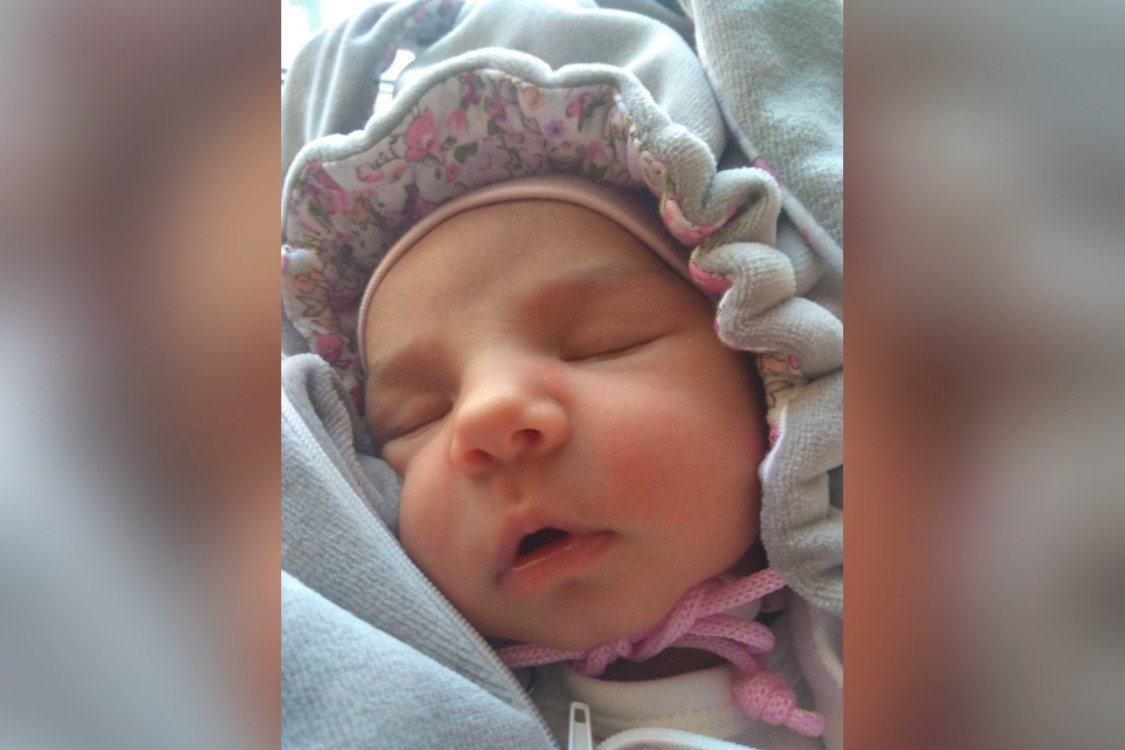
Darina Burdeinyi was born on Oct. 9, 2022 — one day before a Russian missile strike on Kyiv. Photo courtesy Anatoly Burdeinyi.
KYIV, Ukraine — On the morning of Oct. 10, right before the Russian missiles hit, Anatoly Burdeinyi had just stepped onto the balcony of his apartment. On that crisp and quiet fall morning, the 49-year-old businessman looked over Kyiv’s skyline and felt the unbounded lift of untold promises. At a hospital across town, his wife, Nadia, rested. She had given birth to their infant daughter, Darina, the day before. Anatoly smiled. This was the first dawn, and the first full day of Darina’s life. He was anxious to go visit her.
The first explosion smacked his eardrums and shook the ground and sent an orange fireball into the sky. The overpressure shoved his chest and torso. Another blast hit hard, followed by another. Anatoly stood in stunned awe and watched mushroom clouds ascend over his hometown and wondered, “Is this the end?”
When the missiles hit Kyiv, the Burdeinyis' 15-year-old daughter, Maria, was on her way to school. Anatoly immediately called her and learned that she’d sheltered in the metro and was fine. He told Maria to stay there. Then he called Nadia; it took a while to connect since she didn’t have cellular service in the hospital’s bomb shelter. When they finally spoke, Nadia said everything was okay. The doctors had directed all the patients into the shelter when the air raid sirens first sounded. Nadia was safely underground with Darina in her arms when the explosions began.
There was no panic among the doctors and patients, Nadia explained, only a matter-of-fact focus to do the most necessary things as fast as possible. The biggest fear, Nadia said, was that they’d lose electricity. In the ensuing hours, some women gave birth within an operating room the staff had set up in the underground space. Nadia, for her part, cradled her newborn daughter in her arms and worried about what would happen next. “Life had to go on,” Nadia recalled later. “But it is difficult to get used to such attacks. It’s always scary.”
The next day, Oct. 11, Nadia and Darina came home. It didn’t take long for the air raid sirens to wail again. When they did, Anatoly and Nadia looked at each other and asked, “What do we do?”
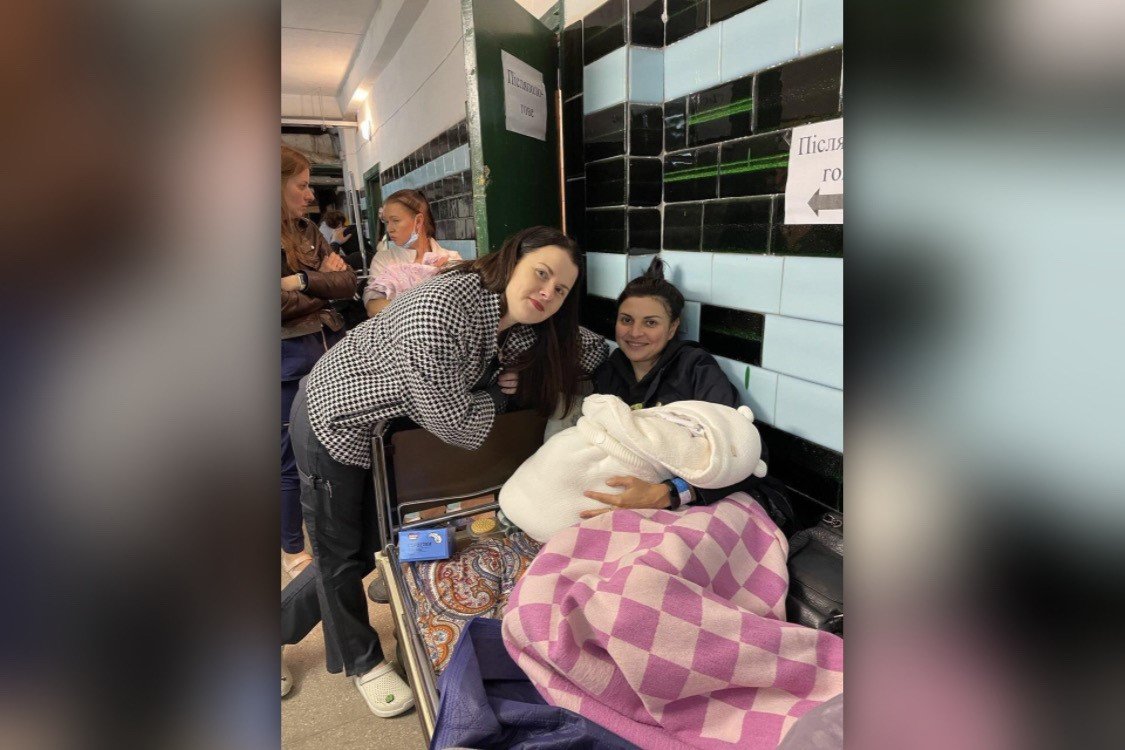
Nadia Burdeinyi and her daughter Darina in the hospital bomb shelter on Oct. 10, 2022. Photo courtesy Anatoly Burdeinyi.
Tough Decisions
On the morning of Oct. 10, Russian cruise missiles struck Kyiv’s city center, including a playground in Shevchenko Park, where Anatoly and Nadia often walked with Maria. Observing the cratered aftermath of the playground strike, Anatoly wondered, “Why? For what reason? To kill some Ukrainian children and some students?”
Anatoly had long suspected Russia would fight a full-scale war one day. When he heard the sounds of explosions on the morning of Feb. 24, the day Russia fully invaded, he said to himself, “I always knew this was going to happen. Always knew.”
Last winter, the Burdeinyis were trying for another child while Russian forces massed on Ukraine’s borders, threatening to invade. It was an uncertain time for Ukraine. Even so, Nadia, 41, and her 49-year-old husband remained committed to another pregnancy. They were also steadfast in their desire to stay in Kyiv despite the gathering war clouds. “We didn’t consider leaving Kyiv before Feb. 24,” Anatoly said. “Why? Because it’s our city. We love it.”
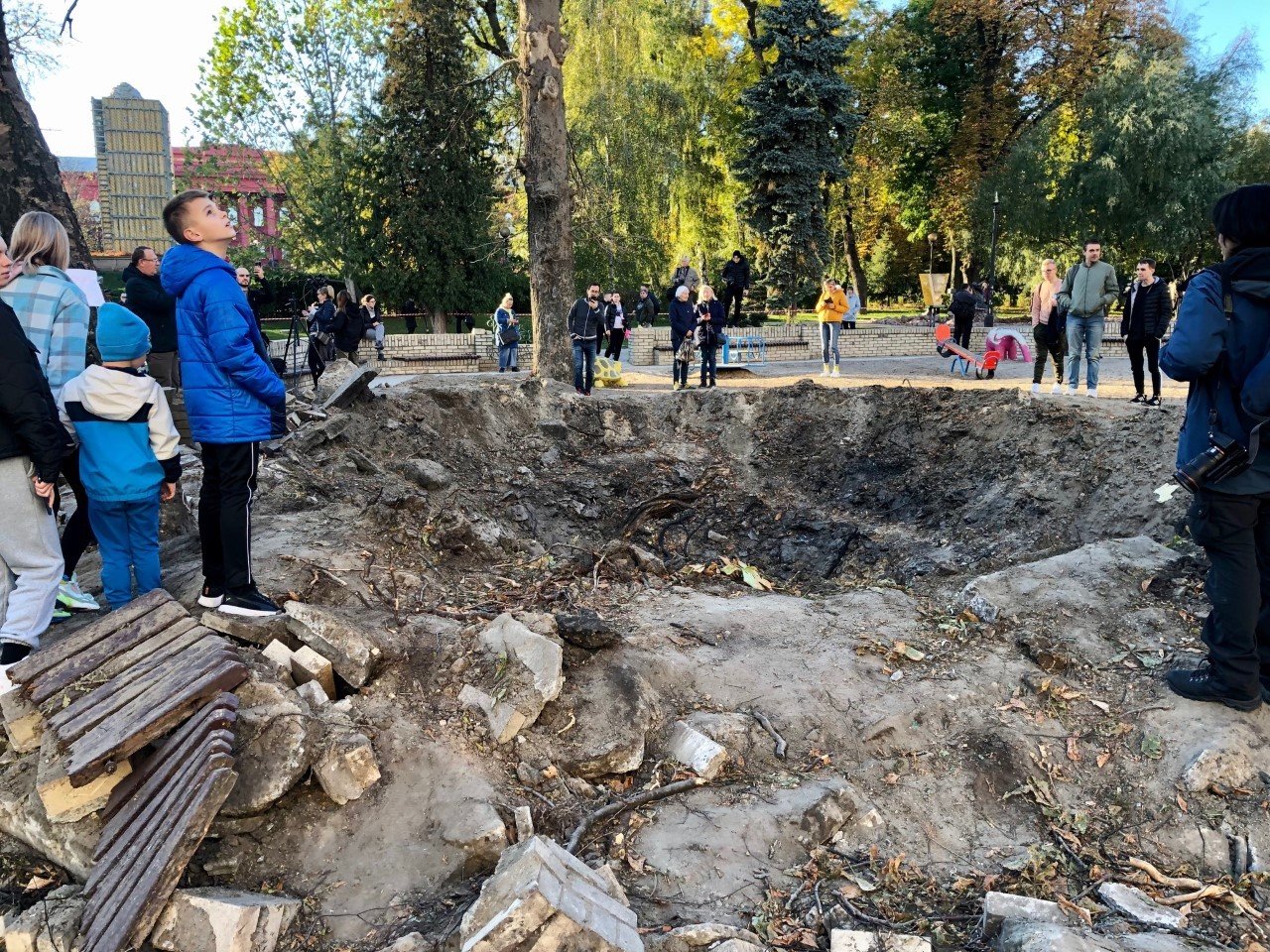
The crater left by a Russian missile, which hit a playground in Kyiv's Shevchenko Park on Oct. 10, 2022. Photo by Nolan Peterson/Coffee or Die.
There were no easy answers about what to do when the full-scale war began. By then, they already knew Nadia was pregnant, and their first instinct was to evacuate. Yet, the highways out of Kyiv were packed to a panicked standstill. Anatoly, a former Ukrainian air force captain who had manned Buk anti-air defense systems, felt uneasy about committing his family’s fate to the assumption that Russia wouldn’t slaughter civilian evacuees. He told Nadia, "Those people in traffic jams are perfect targets for artillery and the air force. It is not a good idea to go now." So they stayed.
In the days that followed, Russia’s invasion force advanced to within earshot of the city center. A full-on sack seemed possible. The Burdeinyis had friends in France who offered them a place to stay. Anatoly told Nadia and Maria they should go, but he planned to stay behind and join a territorial defense force unit. In turn, Nadia told her husband, “I will not leave you.” Maria also refused to leave.
Once the decision was made, staying seemed like the right thing to do, although it wasn’t easy. Anatoly’s mother had cancer, and the war interrupted her course of chemotherapy. She died shortly thereafter. Nadia’s parents were also ill, and she didn’t want to leave them. “We didn't want to go ‘nowhere,’” Anatoly recalled. “We understood that nobody needs us abroad, and the war is our problem. I didn't expect that any help would come.”
February turned to March and Moscow’s lightning stab at Kyiv stalled on the city's outskirts. Within the city center, the sounds of nearby gunfire and shelling and explosions thundered without end. Birds took flight at the bigger blasts. Sometimes, the booms were loud enough to ripple the tops of puddles — like the famous “Anybody hear that?” scene in Jurassic Park. The city emptied out and adopted an eerie, post-apocalyptic air. Streets once busy with pedestrians became still. Restaurants and bars and most shops shut down.
Ukrainian troops turned Kyiv's downtown into an urban fortress. Stacked concrete and barbed wire checkpoints interrupted the streets. Trenches and pillboxes scarred the soil of parks and road shoulders. Territorial defense patrols edgily approached nearly every walker and demanded an identity document.
With a Russian invasion force parked on the city’s edge, the threat of infiltrating saboteurs — known as “diversants” — ate away at whatever sense of calm Anatoly and Nadia could muster. After they noticed a man suspiciously surveying buildings in the city center, they reported him to the nearest territorial defense troops. “It seemed to us that he was handing over geolocation data of various buildings in the center,” Anatoly said.
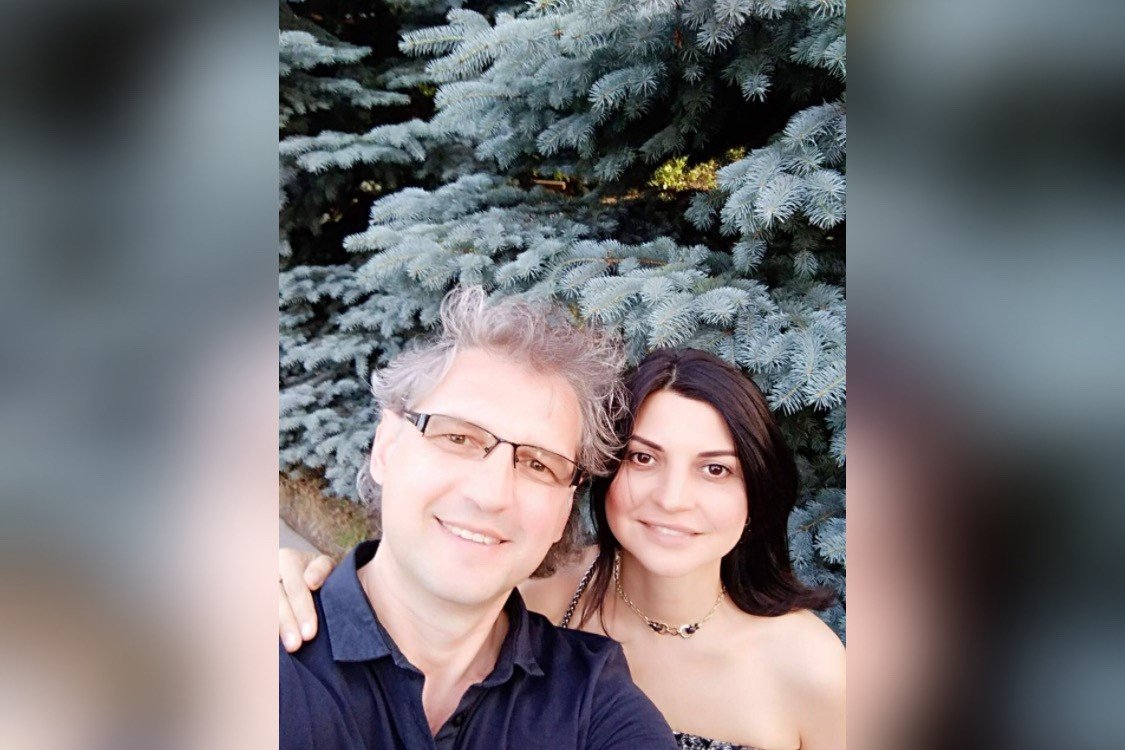
Anatoly Burdeinyi and his wife Nadia in an undated photo. Photo courtesy Anatoly Burdeinyi.
They also worried about the safety of their bomb shelter. They felt vulnerable, crammed inside the small space without a way to defend themselves. Once it was clear that their neighbors knew the shelter’s location, Anatoly destroyed all signs showing the way. “The shelter was completely unprotected by soldiers, we tried to not use light at night, we had no weapons, and saboteurs could freely get in there and simply kill the people inside,” he said.
During the monthlong Battle of Kyiv, things never fell apart inside the city, but it sure felt close at times. Anatoly recalled that a week or two into the war full-scale war, food began to disappear from store shelves. “I understood that we were in danger of starvation,” he said.
Each day produced some new close call, a fresh vignette in their twilight zone existence, which would have seemed laughably implausible before the full-scale war began. “There were several moments when it became really scary,” Anatoly said, recalling the time a Russian missile screamed overhead while they were out for a walk. “Once,” he added, “I witnessed a battle in the city center with the use of small arms and an armored personnel carrier.”
Despite the dangers, the Burdeinyis adapted to life’s wartime rhythms. In the beginning, they descended to the nearest bomb shelter for every raid alert. After a while, they stopped going for the sake of regaining some normality in their lives. But in the night when the sirens sounded, Anatoly's ears strained for any clues of an inbound missile.
In the end, the city did not fall. Looking back, the Burdeinyis believe they made the right decision to stay. “But it was very risky,” Anatoly said. “And the situation could have turned out badly, and even fatally. But at one moment, I realized that Putin had failed with Kyiv. A lot of people were ready to fight.”
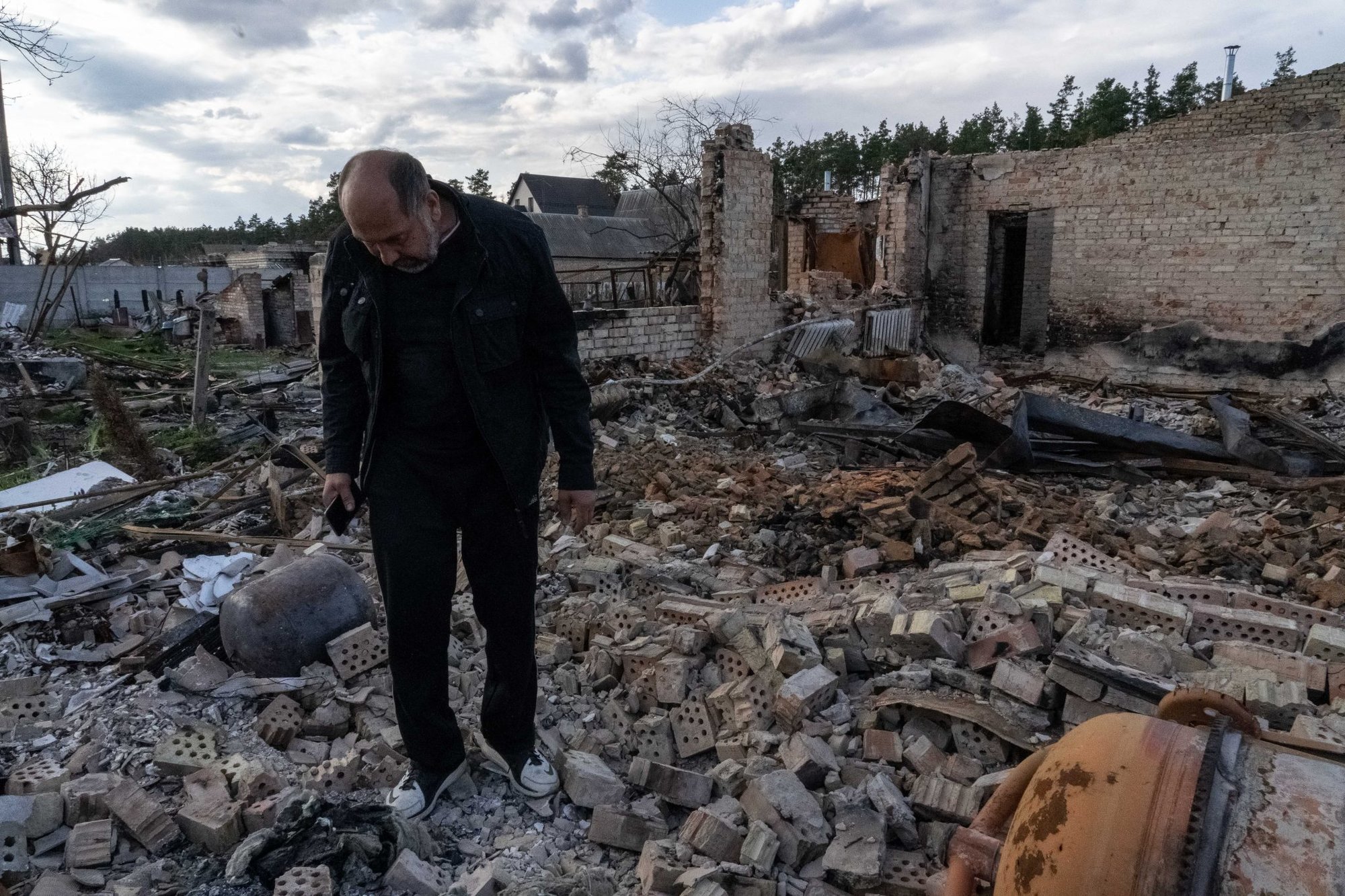
Valeriy, a 51-year-old Territorial Defense soldier, at the ruins of his home in Moshchun, Ukraine. Photo by Nolan Peterson/Coffee or Die Magazine.
Time and Space
The Oct. 10 missile strikes heralded a brutal new phase of Russia’s war, marked by persistent missile and drone attacks against civilian areas and Ukraine’s power grid. Russian strikes have been taking a steady toll on Ukraine’s energy infrastructure and other utilities, raising the specter of a winter without reliable access to electricity, heating, and running water. In such conditions, life in Kyiv could devolve into a day-to-day survival struggle.
“I think winter will be horrible,” Anatoly said. Yet, his family has no plans to leave. “Not at the moment,” he said.
For now, the Burdeinyis have decided not to take their infant daughter to the bomb shelter during air raid alerts. The spartan underground space is moldy and dusty and often packed with other people — many of whom sniffle and sneeze now that the weather is chilling. Certainly not a healthy place for a newborn’s fragile lungs. Not to mention the psychological strain of racing down the stairs and out the door, sometimes in the middle of the night, to sit for hours in a room full of strangers. “We can’t take our baby to this place,” Anatoly said. “It’s forbidden.”
The closest alternative to their bomb shelter is a metro station, but it’s just too far away in a pinch. “So we stay at home,” Anatoly said. “We don’t know what else to do.”
The Burdeinyis have no delusions about the urgency of the dangers they face. They knew Viktoria Zamchenko, a 34-year-old sommelier who died in the arms of her husband, Bohdan, when a Russian kamikaze drone hit their apartment in Kyiv on Oct. 17. Viktoria was six months pregnant, and her death hit the Burdeinyis hard; it eroded the emotional armor that thinking about statistics had provided them.
The chance of death by a Russian missile or drone depends on the accidental alignments of time and space. And although the probability is extremely low, low-probability events happen all the time. “It’s just fate,” Anatoly said.
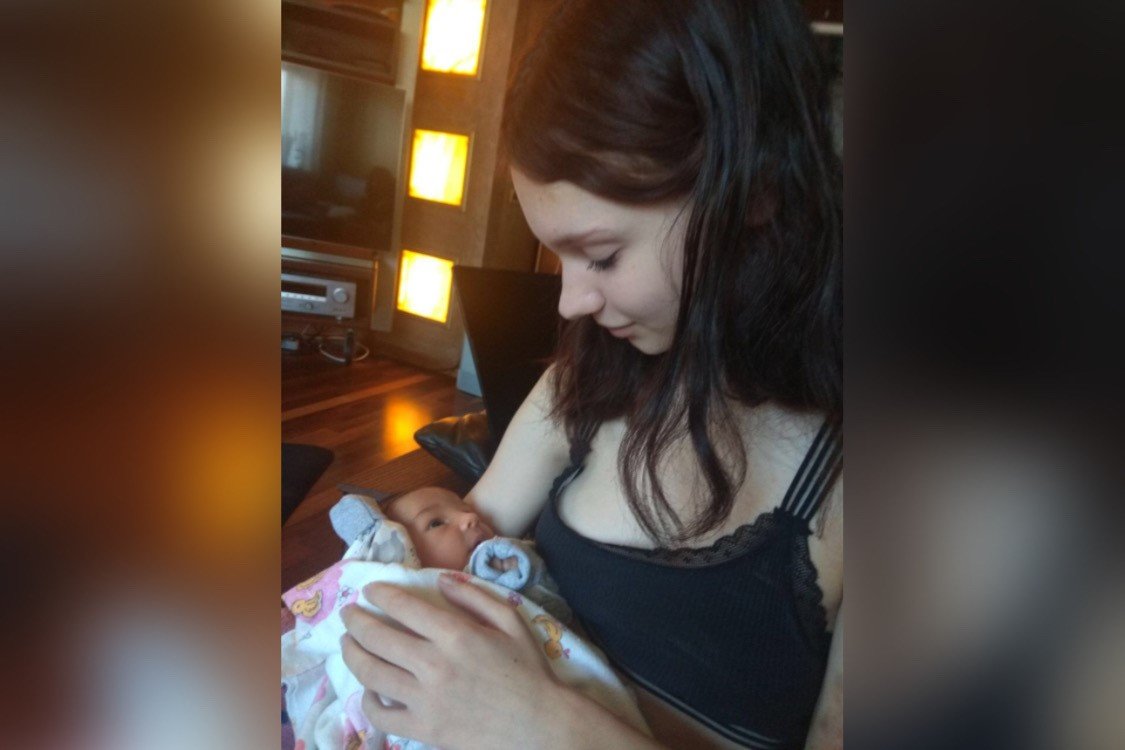
Maria Burdeinyi holds her infant sister, Darina, in October 2022. Photo courtesy Anatoly Burdeinyi.
The Curse of Imagination
In a terror strike campaign, such as Russia is waging, a blind faith in math and an uninspired imagination are your best tools to stay sane. But when someone you know dies, it becomes all too easy to imagine how your own death would go. The possibility of you being unlucky, too, is not so easily dismissed.
When you hear the air raid sirens and decide you’re not going to the bomb shelter, you can’t help but wonder if you just condemned yourself. Each time you take an extra 10 seconds to leave the apartment — to tie your shoes, for example, or to go back and grab a power bank — you wonder if those 10 seconds might decide your fate.
In bed, eyes open, ears attuned to the sirens, you think about the way you and your wife are lying and you remember how the Zamchenkos were found in each other’s arms, and then it’s not so hard to imagine a firefighter finding your bodies, too. You imagine the social media tributes and how your images would flash around the internet for a day or two, until everyone moves on.
You think about the drivers who died in their cars when a Russian missile hit the intersection of Kyiv's Taras Shevchenko Boulevard and Volodymyrska Street on Oct. 10. What events led to those drivers being at that intersection the moment the missile hit? How long ago was their destiny decided? How much agency do we truly have in this daily, deadly crapshoot?
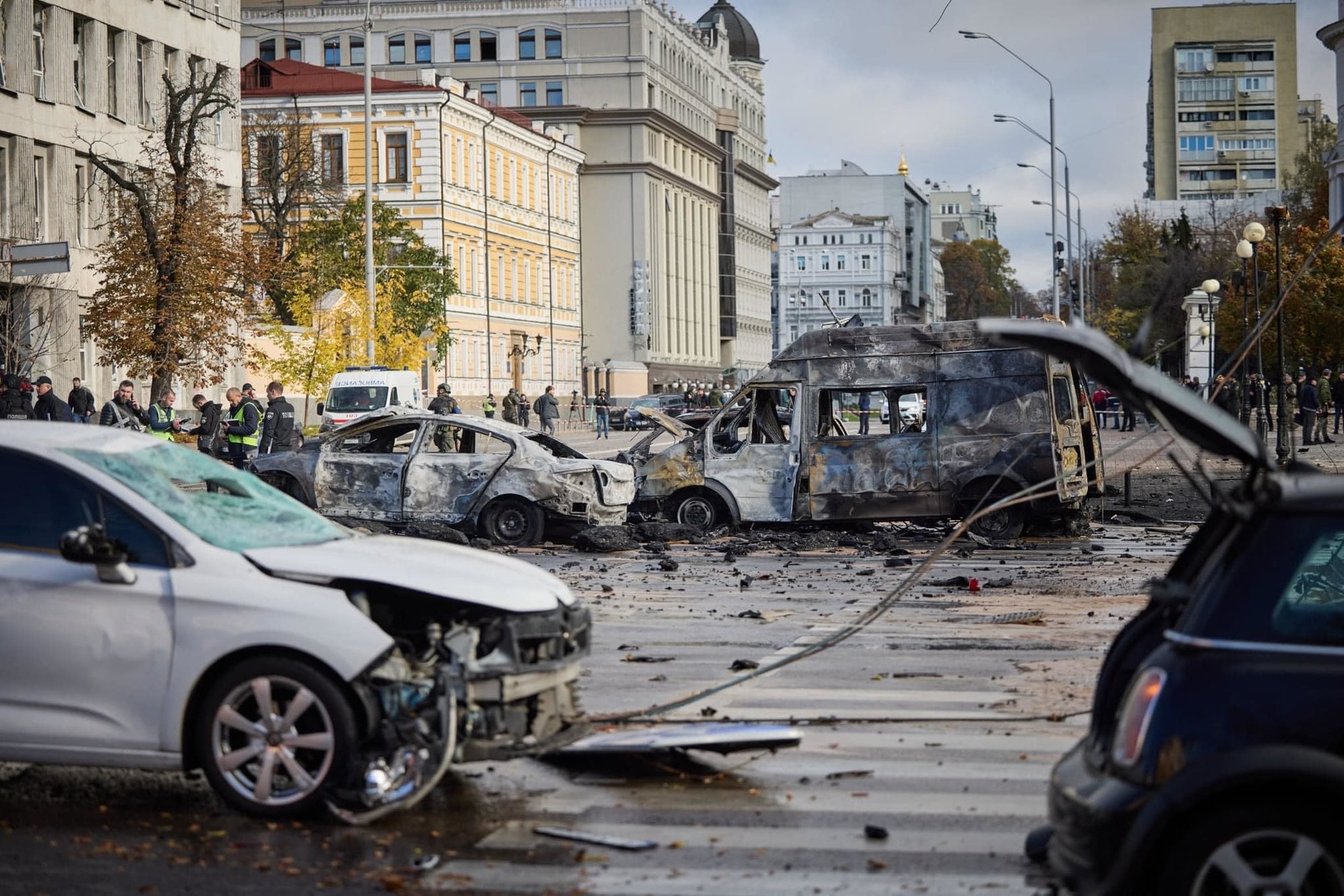
The site of a Russian missile strike on Monday, Oct. 10, 2022, at the intersection of Taras Shevchenko Boulevard and Volodymyrska Street in central Kyiv. Photo courtesy Ukrainian Ministry of Defense/Facebook.
You imagine what went through their minds in the final moment. Maybe there was some sensory prelude, some burst of light or blast of sound, which gave them enough time to register the danger. Maybe they understood what was happening. Or maybe not. Maybe their world just went black.
That’s what this kind of war does. It reminds you that every instant could be your last, and that every decision you make, no matter how minor, could determine your fate. You go grocery shopping and wonder if you've made a lethal mistake. You double back to give her another kiss, and then ask yourself — Did I just bend my path to intersect the next missile?
Yet, we humans can get used to just about anything. Even this. Especially when you believe a better future is worth fighting for.
“Despite all the difficulties, problems, nuances — I love my country,” Anatoly said. “I still hope that this horror will end and our children will be able to live a normal life. All we need is victory.”
Read Next: DISPATCH: Russian Missiles Target Civilians in Central Kyiv

BRCC and Bad Moon Print Press team up for an exclusive, limited-edition T-shirt design!
BRCC partners with Team Room Design for an exclusive T-shirt release!
Thirty Seconds Out has partnered with BRCC for an exclusive shirt design invoking the God of Winter.
Lucas O'Hara of Grizzly Forge has teamed up with BRCC for a badass, exclusive Shirt Club T-shirt design featuring his most popular knife and tiomahawk.
Coffee or Die sits down with one of the graphic designers behind Black Rifle Coffee's signature look and vibe.
Biden will award the Medal of Honor to a Vietnam War Army helicopter pilot who risked his life to save a reconnaissance team from almost certain death.
Ever wonder how much Jack Mandaville would f*ck sh*t up if he went back in time? The American Revolution didn't even see him coming.
A nearly 200-year-old West Point time capsule that at first appeared to yield little more than dust contains hidden treasure, the US Military Academy said.












